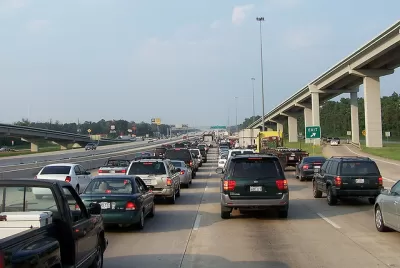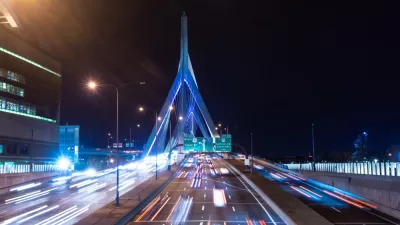The number of "super commuters"—people who commute for over 90 minutes—is still a relatively small percentage of the country, but it's a number that's growing quickly. What does that mean about the economy?

"The number of commuters who travel 90 minutes or more to get to work increased sharply between 2010 and 2015," reports Tim Henderson.
In all but 10 states, the number of “super commuters” increased over the period, and in California, Hawaii, Massachusetts, North Dakota and Rhode Island, it grew by more than 40 percent, according to census data. The growth came amid an overall increase in the number of commuters as the economy improved, but the increase in the number of people with the longest rides, 23 percent, was almost three times the increase in the number of those with shorter commutes, close to 8 percent.
For some insight into the data, Henderson speaks with Mitchell Moss, an urban policy professor at New York University’s Rudin Center for Transportation Policy and Management, Panos Prevedouros, a traffic engineering professor at the University of Hawaii, and David Kack, a program manager for the Western Transportation Institute at Montana State University. Among the culprits for the book in super commutes identified by these sources: the high cost of housing near urban job centers, the rise of telecommuting, and the slow, tenuous recovery from the Great Recession.
FULL STORY: In Most States, a Spike in 'Super Commutes' Over 90 Minutes Long

Planetizen Federal Action Tracker
A weekly monitor of how Trump’s orders and actions are impacting planners and planning in America.

Map: Where Senate Republicans Want to Sell Your Public Lands
For public land advocates, the Senate Republicans’ proposal to sell millions of acres of public land in the West is “the biggest fight of their careers.”

Restaurant Patios Were a Pandemic Win — Why Were They so Hard to Keep?
Social distancing requirements and changes in travel patterns prompted cities to pilot new uses for street and sidewalk space. Then it got complicated.

Platform Pilsner: Vancouver Transit Agency Releases... a Beer?
TransLink will receive a portion of every sale of the four-pack.

Toronto Weighs Cheaper Transit, Parking Hikes for Major Events
Special event rates would take effect during large festivals, sports games and concerts to ‘discourage driving, manage congestion and free up space for transit.”

Berlin to Consider Car-Free Zone Larger Than Manhattan
The area bound by the 22-mile Ringbahn would still allow 12 uses of a private automobile per year per person, and several other exemptions.
Urban Design for Planners 1: Software Tools
This six-course series explores essential urban design concepts using open source software and equips planners with the tools they need to participate fully in the urban design process.
Planning for Universal Design
Learn the tools for implementing Universal Design in planning regulations.
Heyer Gruel & Associates PA
JM Goldson LLC
Custer County Colorado
City of Camden Redevelopment Agency
City of Astoria
Transportation Research & Education Center (TREC) at Portland State University
Camden Redevelopment Agency
City of Claremont
Municipality of Princeton (NJ)





























